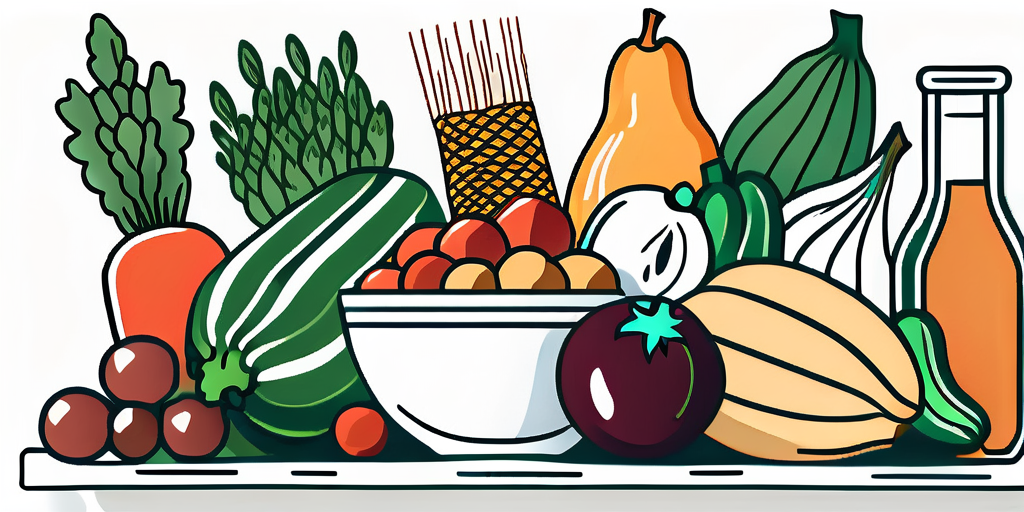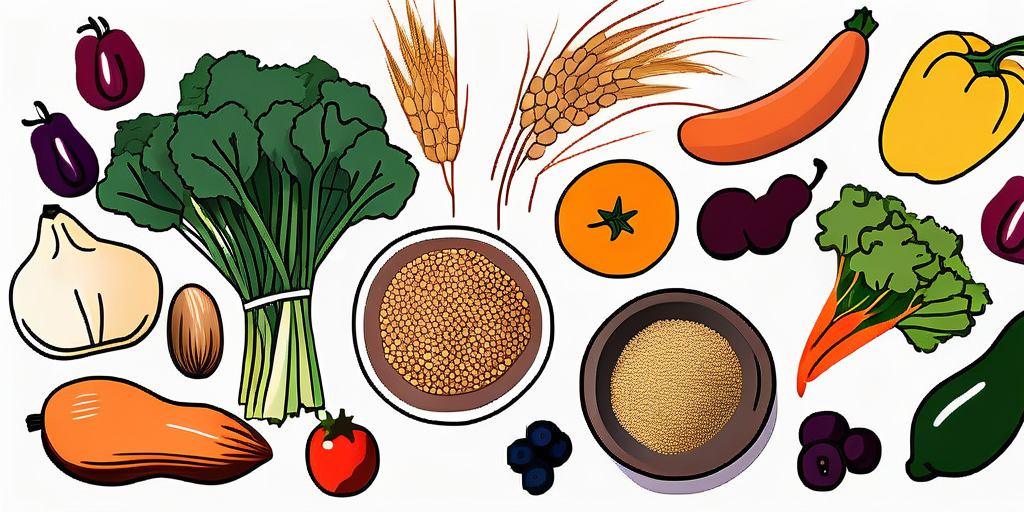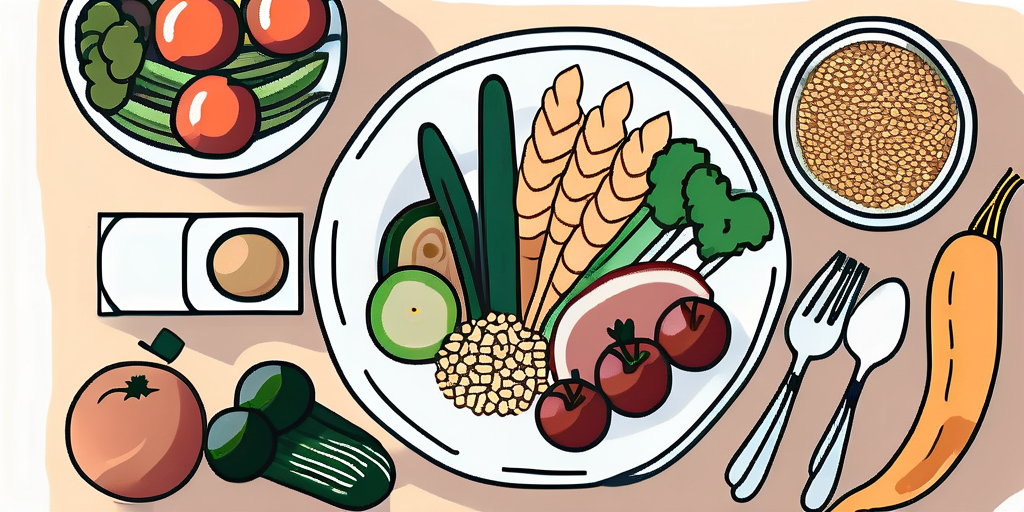Carbohydrates often get a bad reputation, with many people associating them with weight gain and unhealthy eating. However, not all carbs are created equal. In fact, there are plenty of good carbs that are essential for maintaining optimal health. In this article, we will explore the science behind carbohydrates, debunk the myth that all carbs are bad, provide a comprehensive list of good carbs to include in your diet, and discuss the benefits of incorporating these carbs into your daily meals. By the end of this article, you'll have a better understanding of the role that good carbs play in supporting your overall well-being.
Understanding Carbohydrates and Their Role in Our Health
Carbohydrates are one of the three macronutrients, alongside protein and fat, that our bodies need in order to function properly. They are our main source of energy and play a crucial role in various bodily functions. Without carbohydrates, our bodies would struggle to perform even the simplest tasks.
Carbohydrates are made up of sugar molecules, which are broken down during digestion and converted into glucose, the primary fuel for our brain and muscles. This is why carbohydrates are particularly important for individuals who engage in regular physical activity. When you exercise, your muscles rely on glucose to provide the energy needed for movement. Without an adequate supply of carbohydrates, you may experience fatigue and a decrease in performance.
However, it is important to note that not all carbohydrates are created equal. There are two main types of carbs: simple carbs and complex carbs. Simple carbs, also known as refined carbs, are found in processed foods like white bread, pasta, and sugary snacks. These carbs are quickly digested and cause a rapid spike in blood sugar levels, followed by a crash that can leave you feeling sluggish and hungry.
On the other hand, complex carbs are found in whole grains, fruits, vegetables, legumes, and nuts. These carbs contain more fiber and take longer to digest, providing a steady release of energy and keeping you feeling satisfied for longer periods of time. It is these complex carbs that we refer to as "good carbs" and should be included in a balanced diet.
Whole grains, such as brown rice, quinoa, and oats, are excellent sources of complex carbs. They not only provide a slow and steady release of energy but also contain important nutrients like vitamins, minerals, and antioxidants. Including whole grains in your diet can help regulate blood sugar levels, improve digestion, and reduce the risk of chronic diseases like heart disease and type 2 diabetes.
Fruits and vegetables are also rich in complex carbs, along with a wide range of other beneficial compounds. They are packed with vitamins, minerals, and fiber, which contribute to overall health and well-being. The fiber found in fruits and vegetables promotes healthy digestion, helps maintain a healthy weight, and reduces the risk of certain types of cancer.
Legumes, such as beans, lentils, and chickpeas, are another excellent source of complex carbs. They are not only high in fiber but also provide a good amount of protein, making them a valuable addition to a vegetarian or vegan diet. Legumes are known for their ability to lower cholesterol levels, regulate blood sugar, and promote a healthy gut.
Nuts and seeds are also rich in complex carbs, along with healthy fats and protein. They are a great snack option for those looking to increase their carbohydrate intake in a nutritious way. Nuts and seeds provide a wide range of health benefits, including improved heart health, reduced inflammation, and enhanced brain function.
In conclusion, carbohydrates are an essential part of a healthy diet. They provide the energy needed for daily activities and play a vital role in supporting overall health and well-being. By choosing complex carbs over simple carbs, such as whole grains, fruits, vegetables, legumes, and nuts, you can ensure that you are fueling your body with the nutrients it needs to thrive.
Debunking the Myth: Not All Carbs Are Bad
When it comes to carbs, it's important to distinguish between the good and the bad. The idea that all carbs are bad for you is a common misconception. The truth is, our bodies need carbohydrates to function optimally. It's the quality of the carbs that matters.

Good carbs are nutrient-dense and provide a range of vitamins, minerals, and phytochemicals that are essential for good health. They also contain fiber, which aids digestion and helps maintain a healthy weight. On the other hand, bad carbs are typically highly processed and stripped of their natural nutrients and fiber content.
Let's delve deeper into the world of good carbs. Whole grains, such as brown rice, quinoa, and whole wheat bread, are excellent sources of complex carbohydrates. These carbs are digested more slowly by the body, providing a steady release of energy and preventing blood sugar spikes. Additionally, whole grains are rich in B vitamins, which play a crucial role in metabolism and brain function.
Fruits and vegetables are another category of good carbs that should not be overlooked. They are packed with vitamins, minerals, and antioxidants that support overall health. For example, sweet potatoes are a great source of complex carbohydrates, fiber, and beta-carotene, which is converted into vitamin A in the body and essential for healthy vision.
Legumes, such as lentils, chickpeas, and black beans, are also an excellent choice when it comes to good carbs. They are not only rich in complex carbohydrates but also provide a good amount of protein, making them a great option for vegetarians and vegans. Additionally, legumes are high in fiber, which promotes healthy digestion and helps regulate blood sugar levels.
It's worth mentioning that not all carbs are created equal, even within the categories of good and bad carbs. For example, while whole fruits are a healthy source of carbohydrates, fruit juices can be high in added sugars and lack the fiber found in whole fruits. Similarly, refined grains like white bread and white rice have been stripped of their natural nutrients and fiber, making them less nutritious compared to their whole grain counterparts.
So, the next time you hear someone say that all carbs are bad, remember that it's not the carbs themselves that are the problem, but rather the quality of the carbs. By choosing nutrient-dense, fiber-rich carbohydrates like whole grains, fruits, vegetables, and legumes, you can enjoy the benefits of carbs while supporting your overall health and well-being.
Comprehensive List of Good Carbs to Include in Your Diet
Whole Grains: A Rich Source of Good Carbs
Whole grains are an excellent source of good carbs, as they are packed with fiber, vitamins, and minerals. Including these grains in your diet can help reduce the risk of heart disease, type 2 diabetes, and certain types of cancer.

When it comes to whole grains, the options are endless. Brown rice, for example, is not only a great source of good carbs but also provides essential nutrients like manganese and selenium. It is a versatile grain that can be used in a variety of dishes, from stir-fries to pilafs.
Quinoa, on the other hand, is a complete protein that contains all nine essential amino acids. It is also rich in fiber, iron, and magnesium. Incorporating quinoa into your diet can help improve digestion, promote healthy weight management, and support muscle growth and repair.
Oats, a popular breakfast choice, are not only a great source of good carbs but also contain a soluble fiber called beta-glucan. This fiber has been shown to lower cholesterol levels and improve heart health. Additionally, oats are rich in antioxidants and can help stabilize blood sugar levels.
Whole wheat bread is another excellent option for incorporating good carbs into your diet. It is made from whole wheat flour, which retains the bran and germ of the grain, providing more fiber and nutrients compared to refined white bread. Whole wheat bread is a filling and nutritious choice that can be enjoyed in sandwiches, toast, or as a side to soups and salads.
Fruits and Vegetables: Nature's Best Carbs
Fruits and vegetables are not only delicious but also provide a wide range of essential nutrients. These colorful foods are packed with good carbs, fiber, and antioxidants that promote overall health.
Berries, such as strawberries, blueberries, and raspberries, are not only sweet and flavorful but also rich in vitamins, minerals, and antioxidants. They are low in calories and high in fiber, making them an excellent choice for satisfying your sweet tooth while maintaining a healthy diet.
Leafy greens, like spinach, kale, and Swiss chard, are not only low in calories but also high in good carbs and various vitamins and minerals. They are particularly rich in vitamin K, which plays a crucial role in blood clotting and bone health. Adding leafy greens to your diet can help improve digestion, support brain health, and reduce the risk of chronic diseases.
Sweet potatoes are a nutritious and delicious root vegetable that is rich in good carbs, fiber, and vitamins A and C. They are also a great source of antioxidants, which can help protect against cellular damage and reduce inflammation in the body. Sweet potatoes can be baked, roasted, or mashed, and make a satisfying addition to any meal.
Bell peppers, whether red, green, or yellow, are not only crunchy and flavorful but also packed with good carbs and essential nutrients. They are an excellent source of vitamin C, which is important for immune function and collagen production. Bell peppers can be enjoyed raw in salads, stuffed with fillings, or sautéed in stir-fries.
Legumes and Nuts: Protein-Packed Good Carbs
Legumes, such as beans, lentils, and chickpeas, are not only a great source of protein but also contain a substantial amount of good carbs. They are rich in fiber, vitamins, and minerals, making them a nutritious addition to any diet.
Beans, including black beans, kidney beans, and pinto beans, are versatile legumes that can be used in a variety of dishes. They are not only high in good carbs but also provide a good amount of plant-based protein. Incorporating beans into your diet can help improve digestion, support heart health, and promote healthy weight management.
Lentils, another type of legume, are a nutritional powerhouse. They are rich in good carbs, fiber, and protein, as well as various vitamins and minerals. Lentils are easy to cook and can be used in soups, stews, salads, and even veggie burgers.
Chickpeas, also known as garbanzo beans, are a popular legume that is high in good carbs, fiber, and protein. They are a staple in Mediterranean and Middle Eastern cuisines and can be used to make hummus, falafel, or added to salads and curries.
Nuts, including almonds, walnuts, and cashews, are also high in good carbs and provide healthy fats and protein. They are rich in vitamins, minerals, and antioxidants, making them a nutritious snack option. Incorporating nuts into your diet can help support brain health, reduce inflammation, and improve heart health.
It's important to note that while these foods are rich in good carbs, portion control is still key. Balancing your carbohydrate intake with other macronutrients, such as protein and healthy fats, is essential for maintaining a well-rounded and nutritious diet.
Incorporating Good Carbs into Your Daily Meals
Breakfast Ideas with Good Carbs
Start your day off right by incorporating good carbs into your breakfast. Opt for a bowl of oatmeal topped with fresh berries and a sprinkle of nuts. You can also try whole grain toast with avocado and eggs, or yogurt with granola and fruit.

Lunch and Dinner Recipes Rich in Good Carbs
For lunch or dinner, there are endless possibilities for incorporating good carbs into your meals. Consider a quinoa salad with roasted vegetables, a chickpea curry with brown rice, or a whole wheat pasta dish with a variety of colorful vegetables.
The Long-Term Benefits of a Carb-Inclusive Diet
Good Carbs and Weight Management
Contrary to popular belief, good carbs can actually aid in weight management. The fiber found in these carbs helps promote feelings of fullness, reducing the likelihood of overeating. Additionally, good carbs provide sustained energy throughout the day, allowing you to engage in physical activity and burn calories more effectively.
How Good Carbs Contribute to Heart Health
Including good carbs in your diet can have a positive impact on heart health. The fiber in whole grains, fruits, and vegetables helps lower cholesterol levels, reduce blood pressure, and decrease the risk of heart disease. These foods are also rich in antioxidants, which protect against inflammation and oxidative stress.
The Role of Good Carbs in Energy Production
Good carbs are the body's preferred source of energy. They provide a steady and sustainable fuel source for your brain and muscles, allowing you to perform at your best. By incorporating good carbs into your diet, you can feel energized and productive throughout the day.
In conclusion, it's important to embrace the concept of good carbs and include them in your diet for optimal health. Understanding the science behind carbohydrates, debunking the myth that all carbs are bad, and incorporating a comprehensive list of good carbs into your daily meals will set you on the path to improved well-being. By making smart food choices and prioritizing the inclusion of nutrient-rich carbs, you can enjoy long-term benefits such as weight management, heart health, and sustained energy levels. Remember, good carbs are not the enemy. They are a vital component of a healthy and balanced diet.




